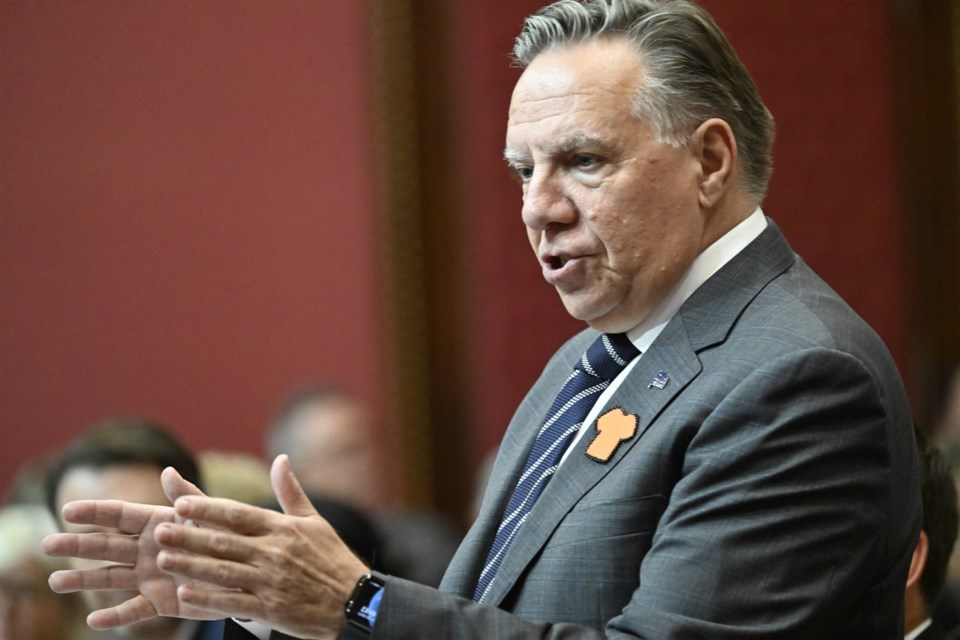MONTREAL — Premier François Legault has made immigration a major focus of his visit to Paris, demanding that the federal government force asylum seekers in Quebec to move elsewhere, including people who have already settled in the province.
Half of the would-be refugees currently in Quebec should be transferred to other provinces, he told reporters on Wednesday at the offices of the Quebec delegation in Paris.
"What I want is for there to be results," he said. "So yes, it should be mandatory, but it's up to the federal government to manage that," he said about the transfers.
Legault's latest remarks follow similar comments on Tuesday, when he said his government has asked Ottawa to create waiting zones for asylum seekers entering the country, similar to a system that has existed for decades in France.
The premier said he intends to address the issue when he meets Thursday with French Prime Minister Michel Barnier.
Legault's comments have prompted pushback from federal Immigration Minister Marc Miller, who suggested Wednesday that Legault's demands are "inhumane."
Miller said the federal government is working with the provinces to distribute asylum seekers more evenly across the country. But he has accused Legault of using immigration for political ends, and said Ottawa cannot force people to move.
"What Mr. Legault is saying is, 'Get rid of these people for us' .... Is he asking us to go get them and send them to Ontario?" Miller told reporters in Ottawa. "I think there’s a lot of politics that’s driving this. I think this is rhetoric that he can weaponize for his own political purposes. I think at the end of the day we have to stay in the reasonable and the practical."
Legault said Wednesday it "doesn't make sense" that Quebec receives about 45 per cent of would-be refugees in Canada, despite accounting for only 22 per cent of the population. According to data from Immigration, Refugees and Citizenship Canada, 45 per cent of the 143,000 asylum claims in Canada in 2023 were made in Quebec.
The Quebec premier has for months been calling on Ottawa to redistribute would-be refugees across the country. On Tuesday, he floated the possibility of "waiting zones" to hold asylum seekers upon their arrival to Canada, invoking a longstanding practice in France.
In July, former Quebec immigration minister Christine Fréchette sent a letter to Miller and Intergovernmental Affairs Minister Dominic LeBlanc outlining that proposal. In it, she suggested setting up a "secure transition site" to hold people whose asylum claims are rejected until they can be sent back to their countries of origin. "It could also be used to facilitate the transfer of certain asylum seekers to other Canadian provinces and territories," she wrote.
Other countries that are "parties to the same international conventions as Canada" use such sites, Fréchette added, and specifically mentioned France.
Waiting zones were developed in France in 1992, and roughly 100 of them exist at airports, ports and train stations across the country. People arriving in France can be held there for up to 26 days if they are seeking asylum, if they are refused entry or if they're denied boarding to the country of their final destination.
Their use, however, is controversial. Media reports have documented that the holding rooms in some of these centres resemble cells. Refugee advocacy groups have called for them to be shut down, claiming people held there often do not have their basic needs met.
Warda Shazadi Meighen, a Toronto-based immigration and refugee lawyer, said it would be very costly to set up similar sites in Canada. She said it's preferable to have asylum seekers find diasporas from their home countries when they arrive. "We want to encourage claimants to find members of their community and to lean on them for support," she said.
Meighen also said there's a heavy psychological toll on people who make the journey to seek asylum in a new country. "To have them being held in these artificial places … is a bit perilous in terms of their long-term integration process," she said.
On Tuesday, Miller said the idea of waiting zones is "a completely different order of magnitude from anything that has been conceived in Canada." He also said Wednesday that Legault's proposal to force asylum seekers to leave Quebec is "insane and unreasonable."
Ottawa is instead offering financial incentives to provinces that want to take in more asylum seekers and is threatening to reduce the number of economic immigrants for provinces that resist.
Meighen said asylum claimants will choose to move to different jurisdictions if there are good reasons to do so — for example, if they can be linked with community contacts in another province, or if their asylum claims will be processed faster.
"There are other ways of looking at redistribution that are a bit more equitable than just holding people in a confined space," she said. "And I think that would be more reasonable."
This report by The Canadian Press was first published Oct. 2, 2024.
— With files from Émilie Bergeron in Ottawa.
Maura Forrest and Michel Saba, The Canadian Press




